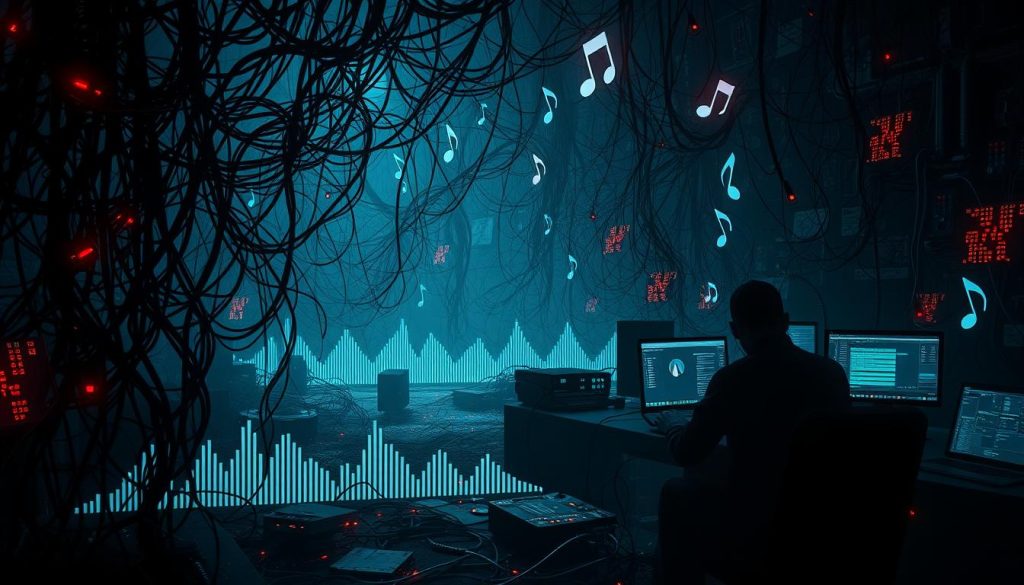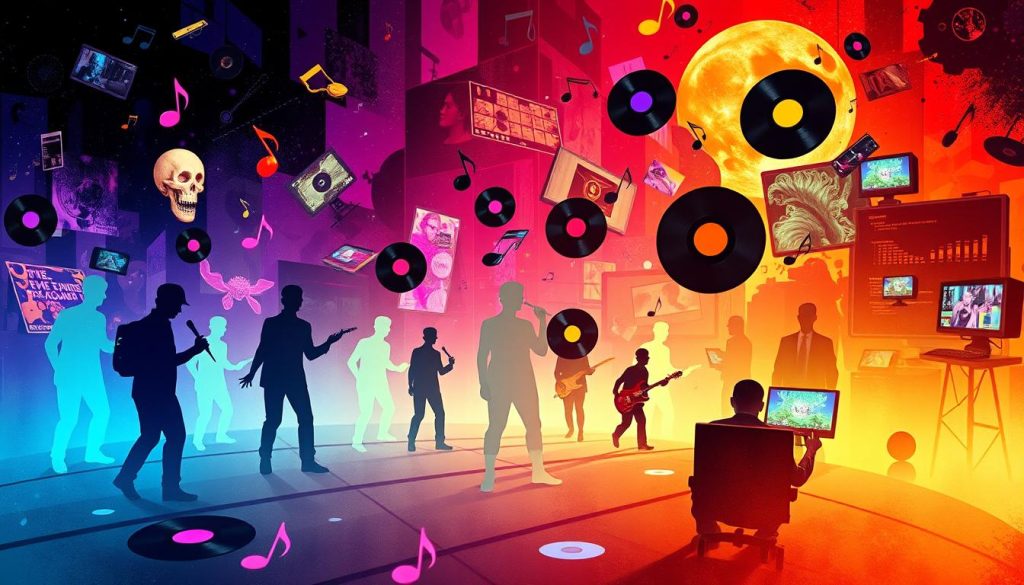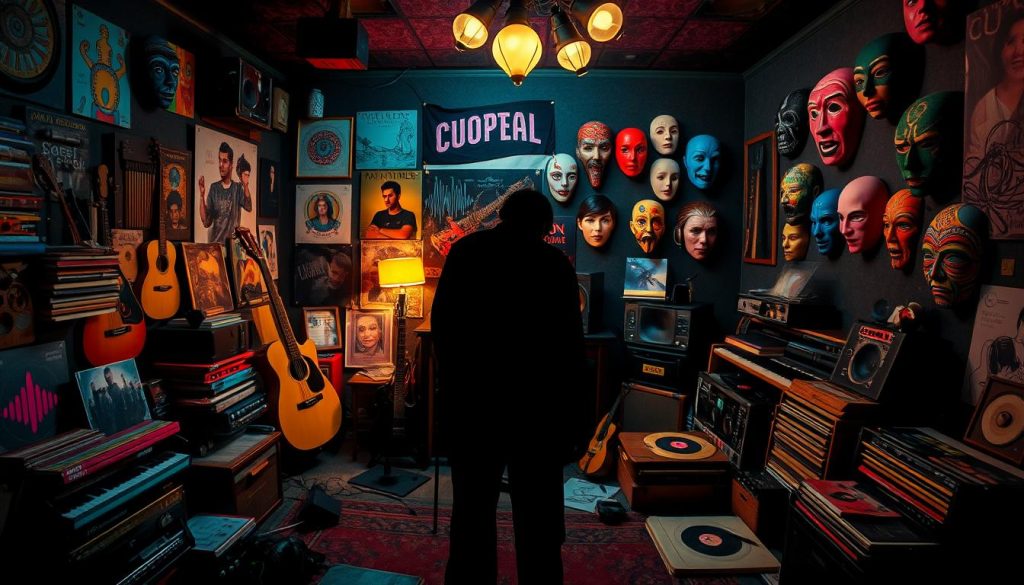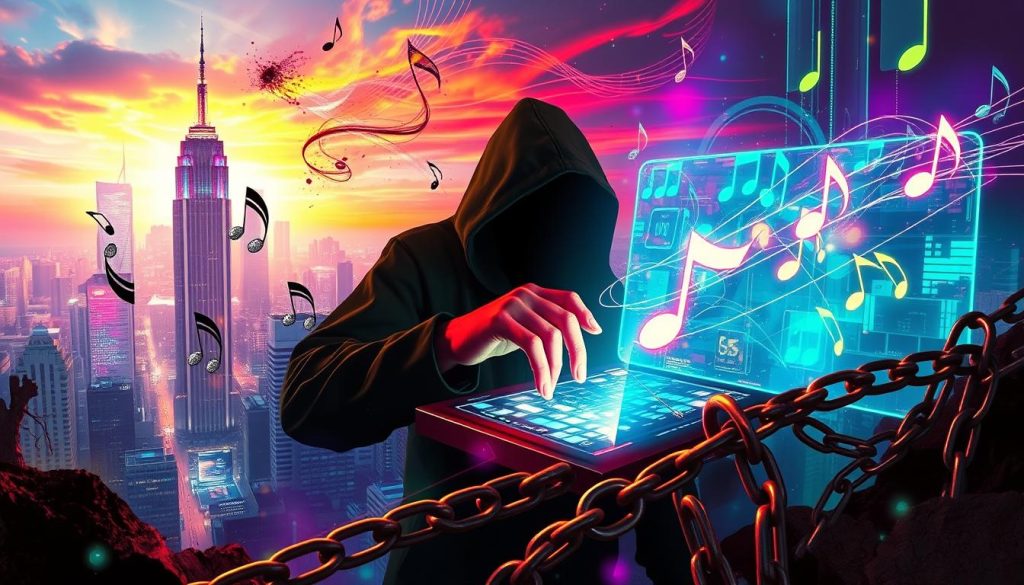In the world of music streaming, a big problem has appeared. Spotify, a leading name in digital music, is caught up in botting scandals. These scandals show how artists and labels are cheating to increase their stream counts1.
Looking into these issues, you’ll find out some shocking things. Spotify is accused of promoting fake artists and letting obscure ones get too much attention. The music industry’s secrets are slowly coming to light1.
But there’s more. You’ll learn why some musicians use fake names and how Spotify’s rules might help them cheat. Get ready to explore the world of Spotify botting scandals and uncover the truth that’s been hidden1.
Key Takeaways
- Spotify has been accused of promoting “fake” artists on its playlists, with some tracks garnering over 1 million subscribers.
- Concerns have been raised about Spotify’s alleged schemes to pay reduced royalties to major labels.
- Independent musicians and producers are using pseudonyms to create content for Spotify playlists.
- Spotify’s licensing practices may be enabling the manipulation of stream counts and playlist placement.
- The music industry is rife with tactics to boost streaming numbers, including the use of bots and the purchase of large quantities of albums.
The Allegations: Spotify’s Playlists and “Fake” Artists
Spotify, a leading music streaming service, is facing controversy. It’s accused of using “fake” artists in its playlists. This could help Spotify save on royalty payments2.
Unveiling the Accusations
Spotify allegedly pays producers a flat fee for tracks in its popular playlists. These playlists have millions of subscribers. This way, Spotify controls the music rights, not the artists2.
Playlists like “RapCaviar” and “Today’s Top Hits” are under scrutiny. They have huge followings. Spotify’s practices with these playlists are being questioned2.
Spotify’s Response: Denying the Claims
Spotify denies creating “fake” artists for its playlists. They say they don’t pay flat fees for song rights. Instead, they license music and pay royalties to the real creators2.
“Spotify do not and have never created ‘fake’ artists and put them on Spotify playlists. All the music on Spotify is licensed from and royalties are paid to rights holders.”
The controversy over Spotify’s playlist practices is growing. It’s making people question the fairness of the music streaming industry. Spotify’s response and its impact on artists and music fans are still unclear23.
spotify botting stories: The Curious Case of Obscure Artists
The Vulture report has uncovered a strange trend. Obscure artists are dominating Spotify’s playlists, sparking doubts about their streams4. Playlists like “Ambient Chill” and “Sleep” feature songs from artists unknown outside Spotify. This has led to rumors of a “fake artist” scheme by Spotify.
Music Business Worldwide (MBW) found 50 artists with millions of streams might be fake4. It seems Spotify might be paying less for these tracks or even buying them to cut costs.
The popularity of “mood” music has helped these unknown artists grow4. Spotify and others have created playlists like “Sleep” and “Relaxing Piano” to meet this demand.
Independent companies are also making money with instrumental music4. They use SEO on Spotify and YouTube, using many names to get more streams. This shows the gray areas in the music industry.
Spotify’s practices are under close watch4. But other big names like Apple and Amazon are just as secretive. This makes it hard for journalists to understand the whole picture.
The story of obscure artists on Spotify shows the music industry’s complexity4. As it grows, we must keep a close eye. We need to make sure artists and listeners are treated fairly.
Behind the Scenes: Independent Musicians and Pseudonyms
Spotify’s playlist scandals have brought to light an interesting story. The Verge found that many “fake artists” are actually indie musicians using pseudonyms. They do this for different reasons5.
These artists say using aliases is common in music. It helps them avoid having too many songs out or keeps them from being in the spotlight. Their real names are often found through performing rights groups, but they choose to use names that aren’t their own5.
Why do they use these names? It’s because they want to keep their projects separate or keep their personal lives private. They also want to control how they are seen by the public5.
Exploring the Reasons for Aliases
Using fake names is not new, but it’s getting more attention now. By understanding why artists do this, we can see the music world’s complexities better. It helps us understand the challenges indie artists face5.
| Reason for Alias | Explanation |
|---|---|
| Avoiding Broad Discography | Some artists use different names to keep their projects separate. This way, they don’t have too many songs out at once6. |
| Maintaining Privacy | Some musicians, like songwriters and producers, use fake names to stay private. They don’t want to be famous5. |
| Controlling Public Persona | Indie artists might use fake names to shape their public image. This way, they can control how they are seen by others5. |
The music world is always changing, and using fake names is a strategy for indie artists. It shows how they deal with the challenges of today’s music scene5. Knowing about these tactics helps us understand the bigger issues with Spotify’s playlists and the push for fairness in music streaming5.
Filling the Playlist Gap: Spotify’s Licensing Practices
Spotify has changed the music streaming world in many ways. One big issue is how it fills its playlists. It often asks independent labels for specific songs to add to its playlists. This content is licensed in a way that lets Spotify use these songs to grow its “Funk Hits” playlist. This playlist has almost 3 million subscribers7.
The deal between Spotify and these artists is not always clear. The details of how much money they make from their songs are not shared. Some artists on these playlists are actually composers working for Epidemic Sound, which has a deal with Spotify. They often use fake names, making it hard to understand who is really involved7.
Spotify’s way of handling playlists can affect the music world in big ways. It can make some artists more popular while ignoring others. This makes people wonder if it’s fair and if it’s good for the artists in the long run8.
| Metric | Value |
|---|---|
| Percentage of podcasts making over $100k per year | 1% |
| Subscribers of “Funk Hits” playlist on Spotify | Close to 3 million |
| NPR’s federated system of brands and member stations | Each with a different look and feel |
The music world is always changing, and the issues with Spotify will keep being talked about8.
“Digital technologies have broadened the notion of ‘creation’ in the music industry, including traditional works and new forms enabled by digital settings, social media, and artificial intelligence.”
Conclusion
The9 Spotify botting scandals have uncovered a complex world of9 music streaming manipulation. There are claims of “fake” artists9, artificial play counts, and Spotify’s questionable9 licensing practices. Despite Spotify’s denials, evidence points to a system where artists and producers use9 pseudonyms to cheat the system.
This situation raises big questions about the fairness of the9 streaming world. It’s clear we need more checks and balances to make sure real artists get paid. The10 tactics used to manipulate playlists and the9 stream farms hurt the music industry’s integrity, making it unfair for everyone.
Spotify and the music industry must take steps to stop9 fraud and promote real growth for artists. This includes9 social media, collaborations, live shows, and9 pitching for playlists. Paid ads can also help artists reach more people and11 connect with fans. By tackling these problems, we can make the music industry fairer and more open for everyone.
FAQ
What are the shocking revelations surrounding Spotify’s botting scandals and the dirty tactics used by artists to manipulate stream counts?
What are the allegations against Spotify regarding its playlists and “fake” artists?
How has Spotify responded to these allegations?
What is the curious case of obscure artists dominating Spotify’s playlists?
Why are independent musicians using pseudonyms on Spotify?
How does Spotify’s licensing practices contribute to the manipulation of the platform?
Source Links
- What’s really going on with Spotify’s fake artist controversy
- Spotify Is Accused Of Creating Fake Artists — But What Is A Fake Artist?
- How To Detect Fake Spotify Playlists
- An MBW reader just blew open the Spotify fake artists story. Here’s what they have to say. – Music Business Worldwide
- The fake artists problem on streaming platforms
- The great big Spotify scam: Did a Bulgarian playlister swindle their way to a fortune on streaming service? – Music Business Worldwide
- Spotify Design and Design Driven Ask What Sound Should Look Like
- Can Online Music Platforms Be Fair? An Interdisciplinary Research Manifesto – IIC – International Review of Intellectual Property and Competition Law
- Understanding Spotify Stream Farms: Risks, Strategies, and Ethics
- Is Taylor Swift Using A Bot Farm to Fraudulently Inflate Her Spotify Play Counts?
- One-Two Punch for Spotify Growth – Two Story Media




